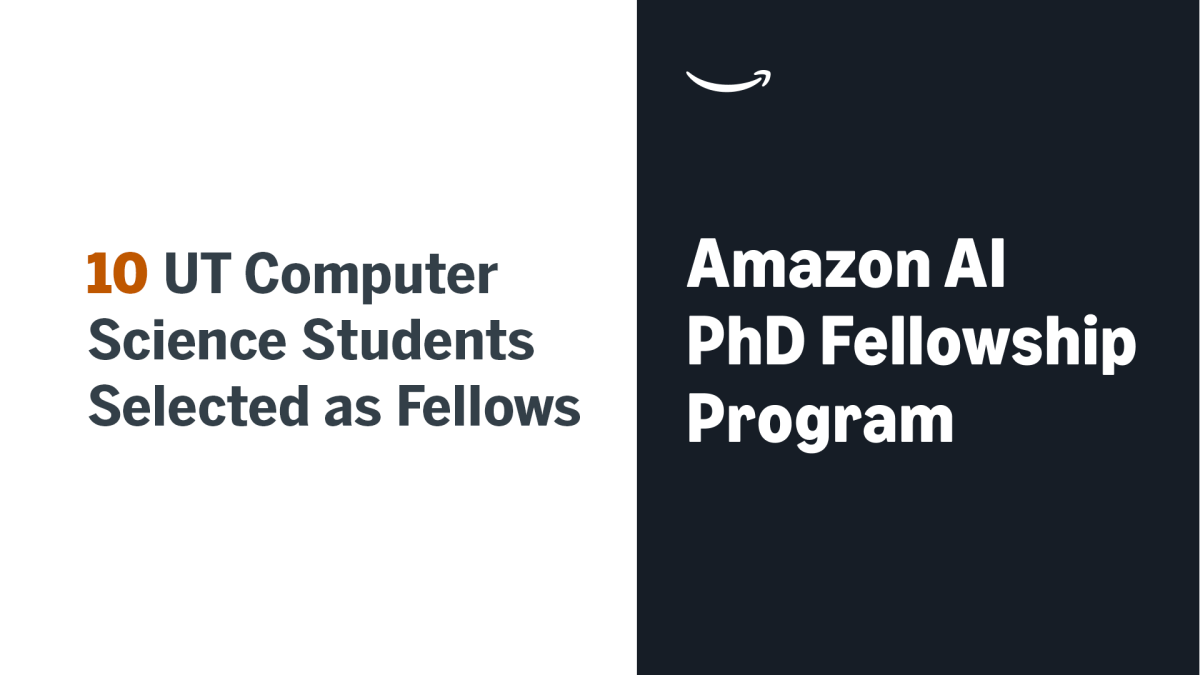
Amazon just announced its new AI PhD Fellowship program, which will provide two years of funding for more than 100 PhD students at nine universities who are pursuing research on core AI disciplines such as machine learning, computer vision, and natural-language processing. The goal of the program is to help drive the innovations that will underwrite the next step in the evolution of practical AI.
UT Computer Science students make up ten of the fifteen University of Texas at Austin students named Amazon AI PhD Fellows -- recognition that underscores the immense talent of our graduate students.
“Amazon’s AI PhD Fellowship Program reflects our ongoing commitment to the academic community. We’re fortunate to collaborate with some of the nation’s brightest PhD students who are advancing critical areas in AI – from high-performance chips and hardware to networking, software, foundation models, applications and more,” said Rohit Prasad, SVP and head scientist of Amazon AGI. “We believe investing in future talent is essential to moving the field forward and creating truly useful AI that benefits everyone.”
In addition to two years of funding, fellows will receive cloud-computing resources and mentorship from Amazon researchers to explore new frontiers in AI innovation and impact.
Meet the UT Computer Science fellows in Amazon's inaugural cohort:
Parikshit Bansal, Computer Science
Parikshit Bansal is advised by Sujay Sanghavi. His research focuses on developing principled algorithms for general machine learning problems. His current work centers on diffusion models for language with a particular emphasis on improving their efficiency.
Rohit Dwivedula, Computer Science (Networked Systems group)
Rohit Dwivedula is advised by Aditya Akella and Daehyeok Kim. His research interests are at the intersection of systems and machine learning, where he focuses on developing AI-driven techniques for improving decision-making in operating systems and cloud infrastructure.
Siddhartha Jain, Computer Science
Siddhartha Jain is advised by Scott Aaronson. He works on quantum algorithms and complexity with a focus on finding applications of quantum computing with provable advantage over classical computation.
Sateesh Kumar, Computer Science
Sateesh Kumar is advised by Georgios Pavlakos and Roberto Martín-Martín. His research focuses on improving the data efficiency and robustness of robot learning algorithms by leveraging large-scale robotics datasets and structured 3D representations. He earned an M.S. from the University of California, San Diego and was previously a researcher at ByteDance Seed and Retrocausal.
Syamantak Kumar, Computer Science
Syamantak Kumar is advised by Purnamrita Sarkar of the Department of Statistics and Data Sciences and Kevin Tian in the Department of Computer Science. His research lies at the intersection of statistics, optimization and machine learning, with a focus on developing principled algorithms for high-dimensional data analysis. His interests include sparse principal component analysis, differential privacy, robust statistics and sampling methods for complex probabilistic models.
Haoyu Li, Computer Science (Networked Systems group)
Haoyu Li is advised by Aditya Akella and Venkat Arun. His research leverages AI techniques to improve the performance and usability of modern systems, with a focus on data analytics pipelines, LLM cache management and scheduling for edge computing and autonomous vehicle systems.
Junbo Li, Computer Science
Junbo Li is advised by Atlas Wang and Qiang Liu. His research focuses on advancing reasoning-driven, agentic large language models and reinforcement learning, with an emphasis on building self-evolving pipelines that can interpret instructions while dynamically leveraging external tools, environments and reasoning to solve complex real-world problems.
Kiazhao Liang, Computer Science
Kiazhao Liang is advised by Qiang Liu. He previously worked as a principal engineer at SambaNova Systems. His research focuses on efficient training methods, sparse neural networks and large language models. He received a B.S. in computer science from the University of Illinois – Urbana-Champaign.
Chutong Yang, Computer Science
Chutong Yang is advised by Kevin Tian. He has a broad interest in the design and analysis of algorithms in theoretical computer science and trustworthy machine learning. His interests include solving problems in learning theory, differential privacy and algorithmic fairness using tools in optimization and statistics.
Xiao Zhang
Computer Science (Networked Systems group)
Xiao Zhang is advised by Daehyeok Kim. His research focuses on networked and distributed systems, with a current emphasis on enabling predictable AI performance at the 5G edge through cross-layer telemetry and resource management. He aims to build practical systems that bridge real-world deployment challenges and core AI infrastructure needs.



